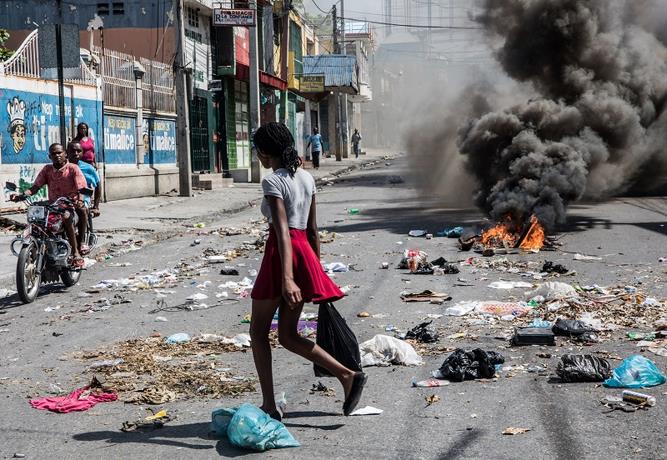Cuban social anthropologist and philosopher, Fernando I Ferran, Director of the Father Louis Aleman Center for Economic and Social Studies, From the Pontificia Universidad Católica Madre y Maestra (PUCMM), five alternatives, evaluated “from the perspective of the national interest”, have been proposed as a contribution to the search for a “cure” and solution to the Haitian issue.
His reflections are part of a variety of studies covered in the so-called “Dialogue and Discussion Notes”, collected in Haitian Studies Unit (UEH) publications.
He sets out to base his method on this issue Five options could, in his opinion, be the “cure” for a problem peculiar to the Dominicans, If he considers that the best alternative to a sustainable solution to the question of the neighboring country is “that which his people build”, while on the other hand he is supported.
In his memoirs, he emphasized the dilemmas of choosing a director to The situation in Haiti It is essentially inclusion, international assistance, individual initiatives, engagement, and pragmatism.
1- containment
On the question of containment, as a first option, he wrote that it is a matter of “cleverly closing all the loopholes, and hiring officials and guards so that others (Haitians) do not continue to violate the perpetual fragility of borders that have been mocked, both by clandestine immigrants, as by accomplices in such a breach.”
In this variant, he explains, “The question is how to eradicate the aforementioned corruption Facilitates the arrival of migrants described as “wanted, but unwanted”, That is, the latter, “wanted, but not wanted.”
2- International aid
With regard to international aid, he proposes “to announce one claim in the media, in social networks and, above all, in secret meetings of notables: only the international community can and must help Haiti, since there is no solution in the Dominican Republic and in similar countries. For this poor crowd and immigrant.”
He adds that in this option, the message is “unique”, but ” mentioning the failure of the international community, Because they want to impose the role of the central state or the Haitian exodus buffer zone on the country.”
3- Individual initiatives
When taking up the issue of individual initiatives, in keeping with the solution to the Haiti issue, Ferrand stated that each does “something”, according to his means, “by untangling his arms convinced that even the little he can do will be more. Reach and contain the unstoppable for centuries…
He warns that “in this case, each individual has to be aware and willing to falsify something unprecedented to the extent of his or her own initiative.”
4- Get involved
When he reaches the point of intervention, he suggests “intervention in Haiti in good faith,” preferably not through evil, “for humanitarian reasons and/or for reasons of Dominican national insecurity or the level of subsequent exposure to the constitutional order.” Dominican coexistence and even Peaceful in the national territory due to the impact of the ongoing political upheaval, social unrest and the impoverishment of a large part of the unstoppable Haitian social bloc.
In such a context, he later asserts, “elective intervention seeks to induce, and who knows whether in extreme cases, to facilitate a civilized order more favorable to the interests of those affected.”
5- Pragmatism
Turning to the option of pragmatism, Fernando Ferran comments that, with regard to the four alternatives noted above, it is necessary to “move forward pragmatically”, but it is necessary to “select the best lessons in terms of what each individual can do and what to avoid and/or each government or a group of them at a time, at last, Facing favorably the case of Haiti and the Dominican Republic.”
Ferran concludes that “it emerges in this case that the interest and responsibility of each individual is the principle and basis of the well-being or discomfort of all.”
Advantages
He is a philosopher and anthropologist of Cuban origin, well versed in the Bates and a wealth of pedagogical knowledge. He has an extensive career in the intellectual and academic fields. He was the recipient of the annual Pedro Henriquez Urreña Prize for the article, with work on it He develops his thesis on culture and being a Dominican.
Born in Havana, Cuba, he has made important contributions to the country, taking up a variety of observations on matters of national interest.
Drowning country.
While the Organization of American States (OAS) refers to those responsible for the crisis in Haiti, The situation continues to push the citizens of that country to migrate through informal channels, particularly through dangerous sea routes, increasing food insecurity and putting thousands of children at risk of acute malnutrition.
The Organization of American States noted the failure of the international community during its 20 years of presence in Haiti and called for a new model of cooperation for the poorest country in the hemisphere.

“Music buff. Social media lover. Web specialist. Analyst. Organizer. Travel trailblazer.”


:quality(85)/cloudfront-us-east-1.images.arcpublishing.com/infobae/ZWABANIBCDIOLTEQBHO73NUL3I.jpg)
:quality(85)/cloudfront-us-east-1.images.arcpublishing.com/infobae/EBAZMEGEYNGSTFVK4C33LA7M2Q.jpeg)



More Stories
This is the world’s largest construction project to be built in Saudi Arabia
The country that surpasses Mexico and Argentina as the largest military power in Latin America in 2024 | Military | Nautical | We | United States | Bab Union | Brazil | Air Force | Global Firepower | argentina | Hot pepper | Mexico | world
The United States returned more than 20 citizens of Western countries from a camp for relatives of ISIS terrorists in Syria